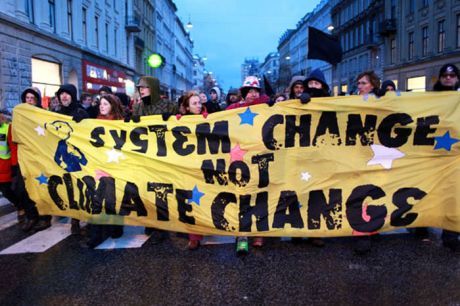Features
You are here
Green jobs and ecological revolution

October 29, 2012
All the material conditions for an ecological revolution are here now. All the techniques for reducing energy consumption and replacing toxic and destructive fuels with clean, renewable sources are at hand. But they are out of reach from lifestyle changes or market solutions. We need an ecological revolution, and a growing movement for green jobs is the first step.
We need to stop burning fossil fuels immediately. To do that we need a massive program to fabricate and install wind turbines and solar panels, to tap geothermal and tidal power, to impose serious environmental regulation on all construction, to retrofit existing buildings, and to stop wars driven by and for oil. We need all this now, if we are to have any chance of mitigating the dangers of a warming climate.
A better world is possible
All this is possible. Despite the propaganda from the fossil fuel lobby and its government adjuncts like Harper’s Tories, alternative technologies are here now, proven and ready to go.
For example, energy consumption could be radically reduced if buildings were constructed without a furnace—even in northern climates—and instead heated by a solar-powered water heating system, triple-paned windows and high efficiency insulation to keep it cool in summer and warm in winter. The entire energy consumption—including hot water, heating and all electric needs—would be just 10 per cent of what it costs just to heat a conventional home. This futuristic building is actually old news. The Saskatchewan Conservation House was first built in Regina in 1977 and has inspired an international movement called Passivhaus—with thousands of similar buildings being built.
Green jobs
The trouble is, a low-consumption sustainable future is highly economical but not profitable. On the other hand, exploiting fossil fuels like Alberta’s Tar Sands is not economical but is highly profitable. So despite being pioneered in Canada, no level of government in this country—no matter which party is in office—has championed these resource-saving, anti-pollution houses. Without a market drive or government intervention, these technologies are left up to individuals—which makes them inaccessible for the 99%
Instead we need society to be reorganized and retooled, and this too is possible. During WWII entire economies were transformed overnight to prioritize the war drive, and to commit unlimited sums to build an atomic bomb. We need that level of change in the opposite direction, not to promote global war but to stop global warming.
To introduce measures on a mass scale, to reduce pollution and conserve energy and other resources, requires millions of green jobs that can unite the labour and environmental movements—and resistance to austerity is already producing this unity. In 2009 British wind turbine workers occupied their factory against closure, demanding “save jobs, save the planet”, sparking a campaign for a million climate jobs. Later that year thousands took to the streets in Copenhagen—uniting indigenous people, environmentalists, students and workers to demand “system change not climate change”—and the same forces converged in Cochabamba in 2010.
In Canada, indigenous-led resistance to tar sands has created a growing movement that includes the labour movement. As a member of the Canadian Auto Workers said in the lead up to the October 22 sit-in against tar sands in Victoria, “tens of thousands of unionized and other jobs depend on healthy river and ocean ecosystems. We will be standing in solidarity with thousands of working people in BC and our First Nations sisters and brothers.”
Ecological revolution
These movements can raise our horizons to the radically different world necessary to stop capitalism’s war on the planet—a world free from the profit-driven market, complicit governments, and the limits of lifestyle change. To effect the change we need to see, we will have to take the productive power in society out of the hands of the few, greedy individuals who control them.
It is not enough to “nationalize” resources and production in the hands of capitalist governments. We need to “socialize” production in the hands of the 99%, democratizing production and recognizing that as part of the natural world we have to make nature’s wellbeing central to our plans, not a luxury extra.
In a recent paper, Carl Cloete, head of the National Union of Metalworkers of South Africa put it brilliantly: “When we talk about social ownership of energy systems we are expressing our determination to resist commodification of electrical power and our desire that energy systems should not be for profit but have as their mandate service provision and meeting of universal needs.” (http://links.org.au/node/3056)
Capitalism is incapable of changing course. Left to itself its inhuman “logic” of competition and production for its own sake will take us all over the cliff. We have the tools to turn things around. We need to claim democratic ownership of those tools. And that means the ecological revolution cannot be achieved without a socialist challenge to the world order.
Section:
- Log in to post comments









